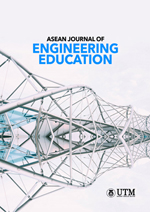Teaching practices among engineering lecturers with and without professional engineer certification: The case of Universiti Teknologi Malaysia (UTM)
DOI:
https://doi.org/10.11113/ajee2024.8n1.151Keywords:
Teaching and learning practices, Engineering lecturers, NALI model, Professional certification, AccreditationAbstract
This paper describes the teaching practices among engineering lecturers with professional engineer certification at Universiti Teknologi Malaysia (UTM). Employing a case study design, this study optimised both quantitative and qualitative data. Questionnaires were distributed to 20 lecturers from various engineering faculties who agreed to be the research participants. From the 20 lecturers, five lecturers with professional qualifications (Professional Engineer, Chartered Engineer) participated in the interviews. Questionnaires were also distributed to the students of these lecturers to compare the teaching approaches of the lecturers with and without the professional engineer certification. The analysis of the quantitative data was conducted using SPSS software, while the qualitative data was analysed using NVivo software. Results were obtained from Spearman’s test and t-test, as well as from the thematic analysis. From the presented results, the finding could be OBE (outcome-based education) is the most preferred NALI approach for the professional engineer (PEng) lecturer implemented in their teaching and learning processes.



















